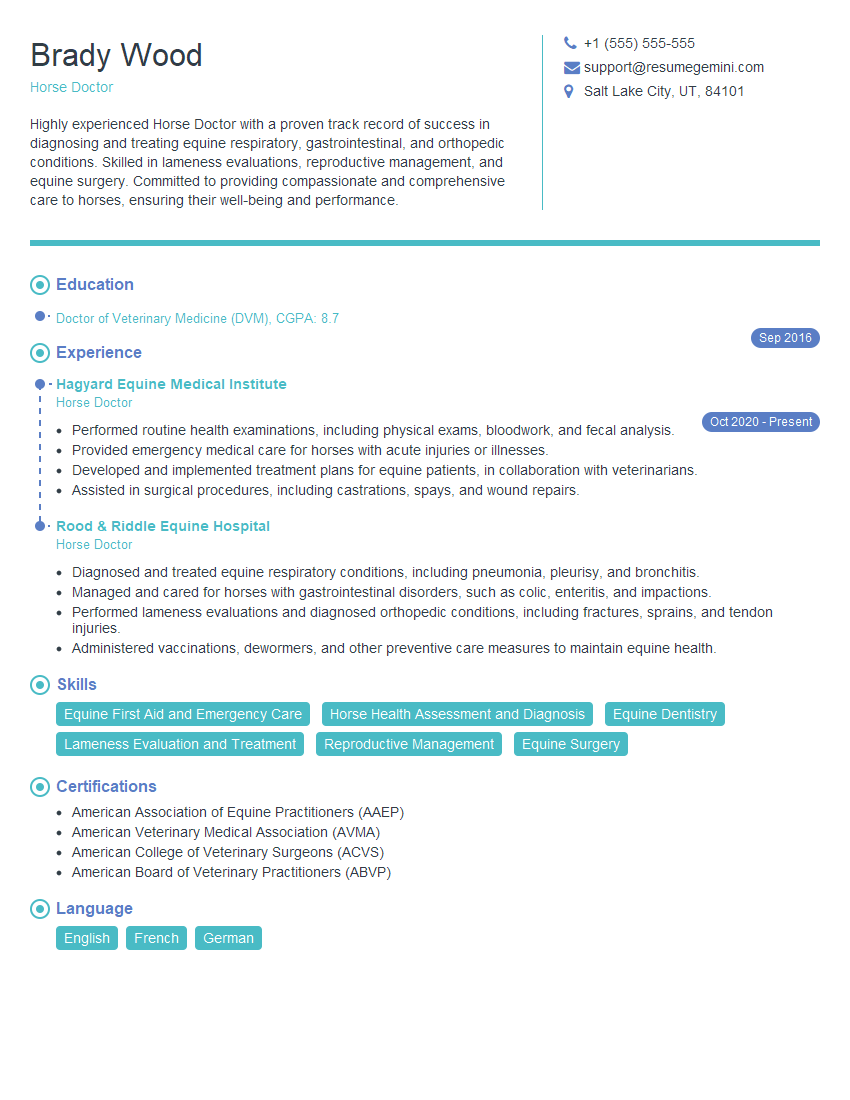Are you a seasoned Horse Doctor seeking a new career path? Discover our professionally built Horse Doctor Resume Template. This time-saving tool provides a solid foundation for your job search. Simply click “Edit Resume” to customize it with your unique experiences and achievements. Customize fonts and colors to match your personal style and increase your chances of landing your dream job. Explore more Resume Templates for additional options.

Brady Wood
Horse Doctor
Summary
Highly experienced Horse Doctor with a proven track record of success in diagnosing and treating equine respiratory, gastrointestinal, and orthopedic conditions. Skilled in lameness evaluations, reproductive management, and equine surgery. Committed to providing compassionate and comprehensive care to horses, ensuring their well-being and performance.
Education
Doctor of Veterinary Medicine (DVM)
September 2016
Skills
- Equine First Aid and Emergency Care
- Horse Health Assessment and Diagnosis
- Equine Dentistry
- Lameness Evaluation and Treatment
- Reproductive Management
- Equine Surgery
Work Experience
Horse Doctor
- Performed routine health examinations, including physical exams, bloodwork, and fecal analysis.
- Provided emergency medical care for horses with acute injuries or illnesses.
- Developed and implemented treatment plans for equine patients, in collaboration with veterinarians.
- Assisted in surgical procedures, including castrations, spays, and wound repairs.
Horse Doctor
- Diagnosed and treated equine respiratory conditions, including pneumonia, pleurisy, and bronchitis.
- Managed and cared for horses with gastrointestinal disorders, such as colic, enteritis, and impactions.
- Performed lameness evaluations and diagnosed orthopedic conditions, including fractures, sprains, and tendon injuries.
- Administered vaccinations, dewormers, and other preventive care measures to maintain equine health.
Certificates
- American Association of Equine Practitioners (AAEP)
- American Veterinary Medical Association (AVMA)
- American College of Veterinary Surgeons (ACVS)
- American Board of Veterinary Practitioners (ABVP)
Languages
- English
- French
- German
Career Expert Tips:
- Select the ideal resume template to showcase your professional experience effectively.
- Master the art of resume writing to highlight your unique qualifications and achievements.
- Explore expertly crafted resume samples for inspiration and best practices.
- Build your best resume for free this new year with ResumeGemini. Enjoy exclusive discounts on ATS optimized resume templates.
How To Write Resume For Horse Doctor
- Highlight your expertise in equine medicine and surgery, emphasizing your diagnostic and treatment skills.
- Showcase your experience in managing a wide range of equine health conditions, from routine care to complex emergencies.
- Emphasize your compassion and dedication to providing the best possible care to horses.
- Include quantifiable results whenever possible, such as the number of successful surgeries performed or the percentage of patients recovered from specific conditions.
Essential Experience Highlights for a Strong Horse Doctor Resume
- Diagnosed and treated equine respiratory conditions, including pneumonia, pleurisy, and bronchitis.
- Managed and cared for horses with gastrointestinal disorders, such as colic, enteritis, and impactions.
- Performed lameness evaluations and diagnosed orthopedic conditions, including fractures, sprains, and tendon injuries.
- Administered vaccinations, dewormers, and other preventive care measures to maintain equine health.
- Performed routine health examinations, including physical exams, bloodwork, and fecal analysis.
- Provided emergency medical care for horses with acute injuries or illnesses.
- Developed and implemented treatment plans for equine patients, in collaboration with veterinarians.
Frequently Asked Questions (FAQ’s) For Horse Doctor
What are the primary responsibilities of a Horse Doctor?
Horse Doctors, also known as Equine Veterinarians, are responsible for providing comprehensive medical care to horses. Their duties include diagnosing and treating equine diseases and injuries, performing surgeries, administering vaccinations and dewormers, and providing preventive care to maintain the health and well-being of horses.
What are the educational requirements to become a Horse Doctor?
To become a Horse Doctor, you typically need to complete a Doctor of Veterinary Medicine (DVM) degree from an accredited veterinary school. This program typically takes four years to complete and includes coursework in equine anatomy, physiology, pathology, pharmacology, and surgery.
What are the key skills required to be a successful Horse Doctor?
Successful Horse Doctors possess a deep understanding of equine medicine and surgery, along with strong diagnostic and treatment skills. They are also compassionate and dedicated to providing the best possible care to their patients. Additionally, they must have excellent communication and interpersonal skills to interact effectively with horse owners and other members of the veterinary team.
What are the career prospects for Horse Doctors?
Horse Doctors are in high demand due to the increasing number of horses being kept for pleasure, sport, and work. They can work in various settings, including private veterinary clinics, equine hospitals, and research institutions. With experience and additional training, Horse Doctors can advance to leadership positions or specialize in specific areas of equine medicine.
What is the average salary for Horse Doctors?
The salary for Horse Doctors varies depending on their experience, location, and type of practice. According to the American Veterinary Medical Association (AVMA), the median annual salary for veterinarians in the United States is approximately $90,000. However, Horse Doctors with specialized skills or working in high-demand areas may earn significantly more.
What are the challenges faced by Horse Doctors?
Horse Doctors face several challenges in their profession, including the need to stay updated on the latest advancements in equine medicine and surgery. They also work with large animals, which can be unpredictable and challenging to handle. Additionally, the emotional attachment that horse owners have to their animals can make it difficult to deliver difficult news or make decisions regarding their care.